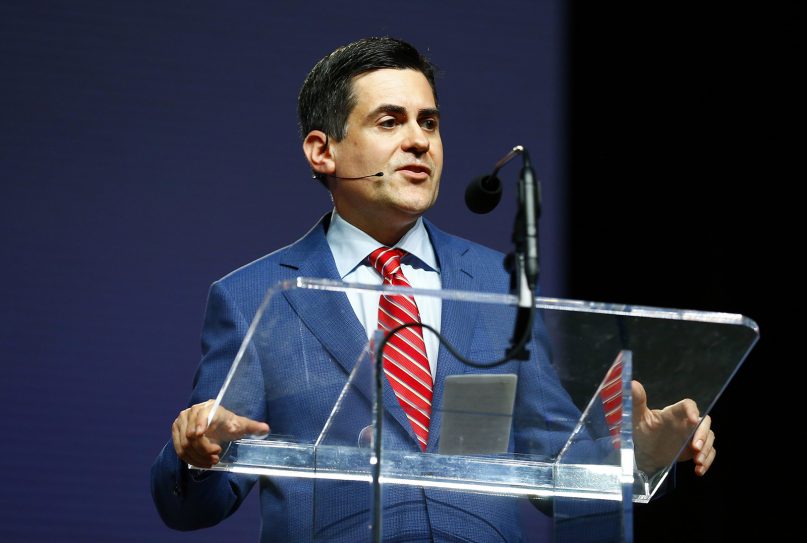
(RNS) — A group of 10 former Southern Baptist Convention presidents have weighed in on a debate over the denomination’s controversial ethics and public policy arm.
In an open letter, the 10 former presidents — some of whom have been critics of the SBC’s Ethics and Religious Liberty Commission — acknowledged the agency has been controversial and can do better. But, they said, that’s no reason to shut the ERLC down.
“Every entity — including the ERLC — should be open to critique and committed to improvement,” the presidents wrote. “But there is a difference between refinement and eradication. A sledgehammer is not the tool for adjusting a mirror.”
The letter, first published by the Baptist Paper, an Alabama-based publication that covers Southern Baptists, was signed by the denomination’s four most recent past presidents — Texas pastor Bart Barber, Alabama pastor Ed Litton, North Carolina pastor J.D. Greear and Tennessee pastor Steve Gaines. Joining them were Louisiana pastor Fred Luter, retired pastor Bryant Wright, Georgia pastor James Merritt — along with longtime denominational leaders Tom Elliff, who also led the SBC’s International Mission Board, retired Florida pastor Jim Henry, and Jimmy Draper, who led Lifeway, SBC’s publishing arm.
The ERLC has survived three votes to disband or defund the entity — which weighs in on social issues and public policy — since the beginning of the Donald Trump era. A vote last summer appeared to have the support of about a quarter of the delegates to the SBC’s 2024 annual meeting in Indianapolis.
Critics of the ERLC — who say the ERLC is out of touch with the beliefs of local church members and lacks close ties to the Trump administration — have engaged in an online public relations war over the agency’s reputation and effectiveness. The online rhetoric over the ERLC has heated up as the 2025 SBC annual meeting — set for June 8-11 in Dallas — draws nearer.
In their letter, the ex-presidents say they have listened to the ERLC’s critics — and, while some of the former presidents share their concerns, they do not believe those concerns warrant shutting down the agency.
“Those of us who would have some measure of critique for the priorities or tactics of the ERLC still believe in the importance of its existence and in its mission,” they wrote. “If this were not the case, we would not have such strong feelings about wanting it to get its mission right.”
James Merritt, who was SBC president from 2002 to 2004 and currently pastors Cross Pointe Church in Duluth, Georgia, told Religion News Service that Southern Baptists still need to have a voice in the public square — and the ERLC fills that role.
“I just think it’s an extremely important responsibility on our part that the largest Protestant evangelical denomination in the country have a presence and a voice in Washington, D.C.,” he said. He also said the ERLC’s leadership is aware of concerns raised by critics and is trying to address them.
Things would be different, he said, if the ERLC were ignoring critics.
The ERLC has been controversial in the past, in large part because the agency often weighs in on public policy and thorny ethical issues like immigration, sexuality and abortion.
Groups like the Center for Baptist Leadership have criticized the ERLC for joining with other anti-abortion groups in opposing legislation calling for women who have abortions to be jailed. Critics have also been angered by the ERLC’s support for immigration reform — even though Southern Baptists have supported such reforms in the past.

FILE – Russell Moore, president of the Southern Baptist Convention’s Ethics and Religious Liberty Commission, speaks June 12, 2019, during the annual meeting of the Southern Baptist Convention at the Birmingham-Jefferson Convention Complex in Birmingham, Alabama. (RNS photo/Butch Dill)
Much of the current controversy over the ERLC dates back to the tenure of Baptist ethicist Russell Moore, who led the ERLC from 2013 to 2021. Moore was popular with Southern Baptists at first but clashed with some SBC leaders — including former SBC Presidents Frank Page and Jack Graham — when he criticized Donald Trump.
The agency has also experienced internal conflict. Last summer, the chair of the agency’s board of trustees announced ERLC President Brent Leatherwood had been ousted after he praised former President Joe Biden for ending his reelection bid. The next day, the trustee chair stepped down and the board announced Leatherwood had not been fired.
Current SBC President Clint Pressley, pastor of Hickory Grove Baptist Church in Charlotte, told RNS earlier this month that he is aware of criticism of the ERLC but said that local church representatives — known as messengers — will decide the agency’s fate.
“I think those concerns about the ERLC will be answered by the messengers,” Pressley told RNS earlier this month. “I can’t do anything about the ERLC.”
At least one pastor has announced plans to make a motion to impose guidelines on the ERLC during the upcoming annual meeting. Critics are expected to make a motion to shut down the agency as well. The SBC’s constitution and bylaws call for two votes to shut down an agency.
The SBC presidents argued that reforming the ERLC is a better outcome than abolishing it. “If the goal is reform, then we urge Southern Baptists to use the means already available — electing presidents, speaking with trustees, and working through the process in good faith,” wrote the SBC presidents.
